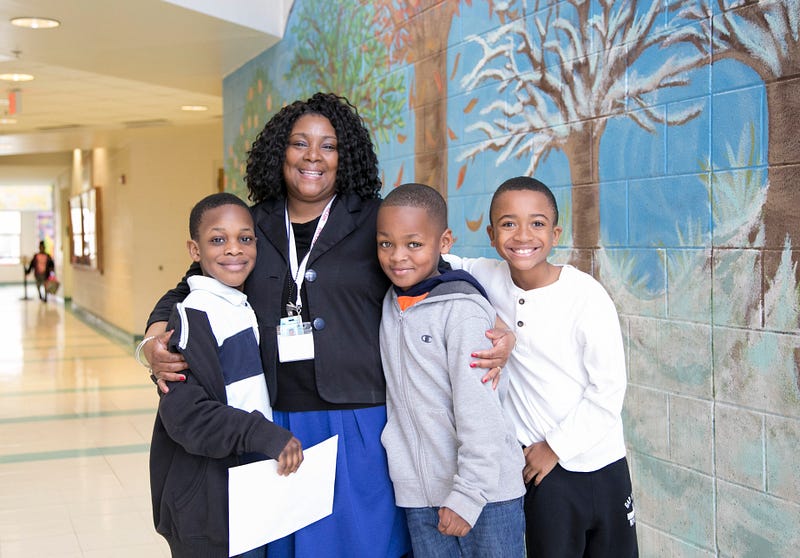The Principal’s Office is Calling (Thankfully) by Duke Storen
We all know the feeling in the pit of our stomachs from childhood (and some of us from parenthood) when being called to the principal’s office. “Oh no. I am in trouble.”
One in 6 children in the U.S. son in trouble and they do have a bad feeling in the pit of their stomachs, not because they are in trouble, but because they suffer from hunger. And, ironically, the principal’s office may be best places to make this feeling go away.

Columnist David Leonhardt has a piece in the upcoming Sunday New York Times, “Want to Fix Schools? Go to the Principal’s Office,” that explores the many ways school principals are making a huge difference in the lives of students.
It’s a great piece. It’s also something No Kid Hungry has known for years. Principals are champions for children, and they are leading the way to end childhood hunger for children in their schools across the country.
Many problems like poverty and healthcare are complex; feeding a hungry child is simple. Principals around the country have unlocked one of the secrets for true education reform, and it has nothing to do with standards, charter schools, or student-teacher ratios. What is the one simple (and already-funded) change that schools can make that improves test scores, reduces behavior problems, increases attendance, and leads to better graduation rates? Expanding school breakfast and providing healthy snacks at the end of the school day.
Anyone with school-age children knows that almost every school provides meals and snacks on test days. Smart principals know that healthy food also needs to be available on learning days.
Across the nation, principals are taking the lead in asking their nutrition directors to change the way breakfast is served, moving away from the failed traditional model of offering breakfast before school in the cafeteria. Instead these schools are now offering breakfast after the beginning of the school day, serving it in the classroom or common areas as students arrive. These simple changes eliminate a whole host of the barriers that make it hard for kids to get the food they need, including not being able to get to school before the bell rings, overcrowded and chaotic cafeterias (which may have 4 different lunch periods but only 15 minutes serving breakfast to all its students before school), and the stigma sometimes associated with breakfast being only for the “poor kids,” despite over half of all school age children in the United States now eligible for a free or reduced price school meal.
Here are just a few of the principals we’ve met who are making a real difference.
Principal Matt Mellor, Little Rock, Arkansas
When asked about implementing breakfast in the classroom in his elementary school, Matt Mellor says his role was to get rid of excuses and say “yes.” “I tell my fellow principals that I guarantee I could walk into your cafeteria and talk to your students and find students who didn’t have the most nutritional breakfast. I could find students who didn’t have any breakfast. I could find students who didn’t have dinner the night before or breakfast. So if we want to change that, if we want to be able to have your students learning and growing right in the morning when their brains are just firing up, when they need the energy the most, why wouldn’t we bring this program in?” Today, his school’s cafeteria delivers insulated bags filled with breakfast to each classroom before the start of the day. Students look forward to being welcomed into the classroom by teachers and friends with a nutritious breakfast ready at their desk. They eat as a family in a calm setting that sets the tone for the remainder of the day. Matt says he can’t think of a better way to build a caring community than to start the morning with breakfast together.
Principal Moe, Longfellow Elementary School, Milwaukee
There was a time when Milwaukee was booming. Factory jobs kept food on people’s tables and money in their pockets. But as factories and other businesses have shuttered or moved abroad, economic instability has affected people’s lives across the city. At Longfellow Elementary school, nearly all of the school’s 370 children qualify for free or reduced price school lunch. Many go home to empty cupboards. Yet, until recently, only about 20% of kids at Longfellow ate school breakfast. It was served in the cafeteria before the school day started, but tight bus schedules get kids to class just before the school day began. Things changed when Principal Jessica Moe learned about breakfast in the classroom. “Once I heard I could get 90% of my kids eating, I was sold,” she recounts. Today, three times as many students are eating breakfast.
Principal Fabby Williams, Guilford County Schools, North Carolina
North Carolina principal, Fabby Williams is no stranger to hunger. Growing up in Liberia, he lived through food insecurity and experienced the consequences. As a principal of a school with more than 70% of high school students who qualified for free and reduced meals, but weren’t eating breakfast, Principal Williams knew he had to make a change. Williams and his team now reach nearly 90% of students with breakfast in the classroom each day. In addition, prior to breakfast in the classroom, there was a noticeable divide amongst local rural students and students bussed in from a nearby city. After sharing breakfast on a regular basis, this divide shifted to a sense of community.
Want to end childhood hunger? Your voice matters. Reach out to your child’s principal and voice your support for a breakfast served after the start of the school day and making a healthy meal or snack available at the end of the school day. And on behalf of all of us, thank her/him for their service.
 Duke Storen is senior director of research/advocacy for our partner organization Share Our Strength, a national non-profit dedicated to ending child hunger in the United States. Through their financial and technical assistance, the Alliance, lead partner for the No Kid Hungry campaign in Arkansas, is increasing access to child nutrition programs for Arkansas’s children.
Duke Storen is senior director of research/advocacy for our partner organization Share Our Strength, a national non-profit dedicated to ending child hunger in the United States. Through their financial and technical assistance, the Alliance, lead partner for the No Kid Hungry campaign in Arkansas, is increasing access to child nutrition programs for Arkansas’s children.
